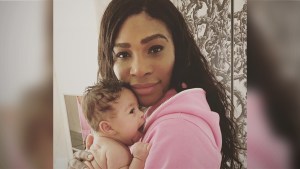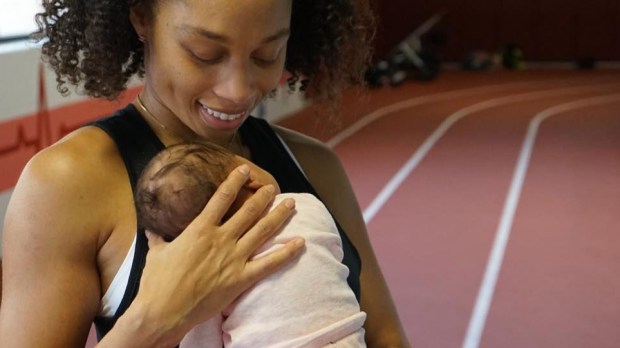Allyson Felix is one of the best sprinters in the world. She has nine Olympic medals, the last two of which she won at the Olympic Games in Rio de Janeiro in 2016. According to ESPN, this makes her the “most decorated woman track and field star in U.S. Olympic history.”
In recent years, Felix has been the protagonist of publicity campaigns for Nike. Nevertheless, when she decided to become a mother in 2018, Nike turned its back on her.
Maternity as a priority
Felix’s contract with Nike expired at the end of 2017, and she began negotiations to renew her relationship with the company. In May 2018, she found out she was pregnant, and gave birth on November 28 to a precious little girl to whom she and her husband, Kenneth Ferguson, gave the name Camryn.
On December 20, just a few weeks after her baby’s birth, Felix published a long article on ESPN’s web page in which she revealed details of her pregnancy, which had ended with an emergency C-section.
She said she knew that becoming a mother could affect her running career, but she was “up for it.” She was tired of trying to live up to other people’s expectations, including that she should always “put running first.” She needed to be herself, and to be guided by higher priorities. “I’m trying to be open to what God has in store for me and my family,” she says in the article.
No protection for mothers
Sure enough, when the time came to renew her contract with Nike, the company offered her a contract with a 70% pay cut, because she might not run as much or as fast while recuperating from her pregnancy. She felt the need to push for contractual protection as a mother, asking Nike to “contractually guarantee that I wouldn’t be punished if I didn’t perform at my best in the months surrounding childbirth.”
She revealed this when she decided to follow the example of other women athletes who had become mothers, Alysia Montaño and Kara Goucher, and publicly denounce Nike’s practice of cutting pay to mothers. She published an op-ed piece in the New York Times in May of this year. At that point, as a result of the other athletes’ articles, Nike had promised to revise its contracts to protect women athletes during pregnancy, but the company had yet to reveal specifics.
Victory off the track
On August 12, Felix and her fellow athletes won their battle. Nike sent out an email signed by John Slusher, Executive Vice President of Global Sports Marketing for Nike, in which he announced the inclusion of a maternal protection clause in its contract with women athletes. Felix shared the email on her Instagram account, which has more than 600,000 followers:
The clause reads: “If ATHLETE becomes pregnant, NIKE may not apply any performance-related reductions (if any) for a consecutive period of 18 months, beginning eight months prior to ATHLETE’S due date. During such period NIKE may not apply any right of termination (if any) as a result of ATHLETE not competing due to pregnancy.”
In the text accompanying the photo of the email, Felix celebrates the fact that she and her colleagues had managed to make Nike change the way it treats women. She also thanks all the brands who have made similar commitments.
The power of women speaking out
In her text, Felix also wrote, “Our voices have power. NIKE has joined in officially and contractually providing maternal protection to the female athletes they sponsor. This means that female athletes will no longer be financially penalized for having a child.”
Still, Allyson Felix is no longer being sponsored by Nike. She recently decided to sign a contract with a different company, Athleta.
She continues to show that her professional career is important to her, but she is not willing to renounce motherhood. On her official website, her description includes, “Allyson has accomplished so much, but her greatest accomplishment and her greatest love is her daughter, Camryn, who reminds her every day that she can never stop fighting for what is right in this world.”
Read more:
10 Olympic athletes who were not afraid to share their faith

Read more:
Serena Williams’ career decision makes an important statement about motherhood

